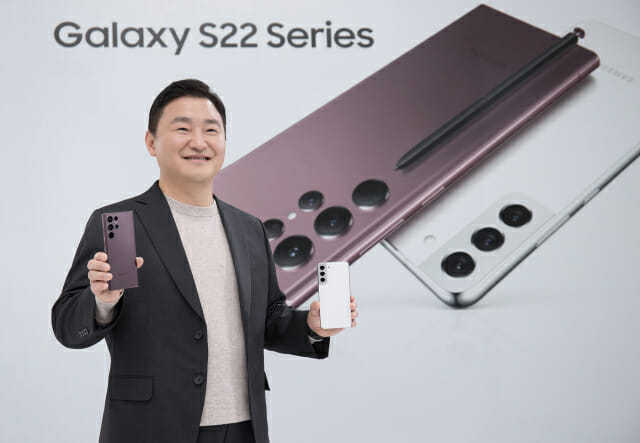 |
Roh Tae-moon, mobile chief at Samsung Electronics, introduces the Galaxy S22 series at the Galaxy Unpacked event held online on Feb. 10. (Samsung Electronics) |
Market bellwether Samsung Electronics, whose shares are practically held by one out of every 10 South Koreans, is suffering from heavy selling by an army of once-loyal investors disappointed over the tech giant’s underperforming shares.
The stocks have slid since January to fall below 70,000 won ($56) on Tuesday in a four-month low since November.
Regulatory filings, revealed Tuesday, showed some 120,000 retail investors sold shares in Samsung Electronics in the fourth quarter last year, when the world’s largest memory chipmaker and second-biggest contract chip manufacturer saw shares retreating on gloomy prospects.
The number of minority shareholders holding less than 1 percent equity in the company as of December last year was 5.06 million, down from 5.18 million in September the same year, according to the Financial Supervisory Service.
Shrinking retail ownership in the chipmaker was last seen in 2019, when the number of minority shareholders fell to 568,313 in the fourth quarter, from 606,447 in the preceding quarter. Retail ownership had since seen gigantic growth as pandemic cash injections fueled robust retail demand.
But foreigners and institutions continue offloading the shares, on fears that raw material imports from Russia -- which are essential for chip manufacturing -- could face disruptions.
“Samsung has enough supplies to make chips, and even if there are disruptions affecting chip building costs, the chipmaker wouldn’t be hit by big losses,” said Hwang Min-seong, an analyst at Samsung Securities.
Experts said the chipmaker would post impressive operating profits for the first quarter on strong demand and a surge in memory chip prices.
Meanwhile, the chipmaker is facing increasing backlash from consumers who are filing a lawsuit over what they claim to be false advertising tied to the performance of its latest flagship smartphone Galaxy S22.
Users have complained that apps running on Galaxy 22 phones are unable to reach the “best performance” that Samsung Electronics promised to deliver because of software called Game Optimizing Service installed on every Galaxy phone when it is manufactured.
The software forces apps to not run at their full capacity in order to help batteries last longer and avoid overheating them, according to users. Users said the chipmaker knowingly defrauded consumers when it touted “best performance” to lure customers.
Samsung said it will address the issue when it upgrades the Galaxy series.
By Choi Si-young (
siyoungchoi@heraldcorp.com)




![[Weekender] Korea's traditional sauce culture gains global recognition](http://res.heraldm.com/phpwas/restmb_idxmake.php?idx=644&simg=/content/image/2024/11/21/20241121050153_0.jpg)



